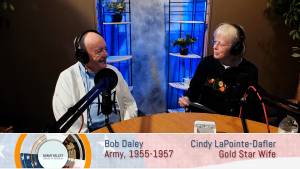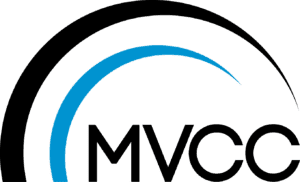Marking a Milestone: 25 Episodes, Miami Valley Salute to Veterans
Since launching the podcast center at MVCC in 2022, we’ve seen so many creators enthusiastically respond with television shows and podcasts using the new technology. Two years later, several of these producers have now reached the milestone of twenty-five episodes.
Cindy LaPointe-Dafler is a Gold Star wife and widow of Medal of Honor recipient Joseph Guy LaPointe Jr., while Bob served in the Army from 1955-1957 and was the Director of Public Affairs and Communications with the Kettering Foundation for 35 years. Cindy and Bob signed up for the free podcasting workshop at MVCC and now have a regularly scheduled series that can be seen each week on both GATV5 and CATV 991, online at www.mvcc.video, and on the MVCC YouTube channel.
We met with Cindy and Bob to talk about her podcasting.
Q: Congratulations on reaching this milestone – 25 podcast episodes is quite an accomplishment! Did you ever think you’d be adding Podcaster in with all your other volunteer efforts?
Cindy: “No! It never crossed my mind. I did do an interview at MVCC with Linda Swink, who wrote my late husband’s biography, and we both enjoyed that experience very much. It’s hard to believe it’s been twenty-five.”
Bob: “Moderating podcasts with military veterans is a personal delight and an honor. Our country’s veterans are national heroes, and their stories are an important part of the history of our community and country.”
Q: Why did you start the Miami Valley Salute to Veterans program?
Bob: I’ve been a fan of public access television from the beginning. It is a great communications vehicle that helps us know and understand what is going on in our communities – in local government, for example. The recent addition of the Miami Valley Salute to Veterans is a welcome expansion of the outreach to the community, in this case to help tell the stories of those who put on the uniform to serve our country.
Hanging out at the Miami Valley Communications Council, I heard about the plans for the podcasts and asked if I could be a part of the project. I remain involved because of my high regard for military veterans. I remember Pearl Harbor, World War II, Korea, and Vietnam. Being part of this program is my way of recognizing their service and saying, “thank you for your service.”
Cindy: “Richard Diaz came up with the idea of having a podcast focusing on veterans and their military experiences. He asked me if I would like to be the host. I agreed immediately! He encouraged me to come up with the questions, which I loosely follow based on the Library of Congress Veterans History Project. Mine is much shorter. I can veer from the questions to wherever the conversation leads. The setup to me is favorable to a personal conversation. It’s just the veteran and me in the studio.”
Q: You’ve done such a good job speaking with veterans with a wide range of experiences and even decades of service.
Cindy: “I found that once a veteran is aware that I am a war widow, they tend to open-up to me. I don’t push for anything too deep unless the veteran leads us that way. I have also interviewed a Gold Star Father and Gold Star parents. Those are the toughest, but they thanked me. I encouraged them to talk about their sons. I believe that is so important, to tell those stories of their children who have died.
For the other veterans, they have all been happy with taping the interview. After Richard edits the video, we send the link to the interviewee so they can see it and share as they wish. I have talked to veterans who served many years and those who served a short time, and all in-between. I have interviewed veterans who have gone into war zones, and those who never left the country. To me, all are equal. When they signed up, they didn’t know where they would end up, whether it would be in a war zone or anywhere else in the world or stay right here in the USA.
Bob and Richard and I work to get veterans scheduled for our podcasts. Robert Kincses and Richard created a brochure which explains the program, and that is a good thing to have. Getting the word out is important.
We’ve interviewed generals to privates. I don’t ask their rank; the veteran tells me if they want to.
Bob has backed me up when I couldn’t make a date and as a newspaper man, he is very experienced interviewing people. I know he makes people feel comfortable talking to him, you can see it in his programs he’s done. Bob was my first interview! That helped!
I volunteer other places doing a variety of things, but I have to say that this makes me feel more alive than anything else I have done.”
Q: Tell us about some of the feedback you’ve received from listeners and viewers.
Bob: “Three of the veterans among the early interviewees had taken part in the Honor Flight experience. They remain active with veterans’ groups and are proud of their service to our country. They support the podcast series and embrace fellow veterans.”
Cindy: “I have received good feedback from those who have seen the program. It may be counter-intuitive, but I get my greatest satisfaction hearing back from the veterans and the families. If they are happy, I am happy.”
Q: How much scripting do you prepare for a show, and do you get through it all?
Cindy: “I do have my script that I use. I have my list of questions, and I skip some, and add some others as the conversation guides me. I have that curiosity, and I do want to ask the questions that the audience might ask. Why did you choose the branch that you did to had you ever left home before you went to basic training, and how did you feel about that? Many times, that answer leads to another question.”
Bob: “There are some basic questions that set the basics for every interview. Every veteran has a story to tell. What makes some podcasts especially interesting are veterans who have had unusual experiences like landing on the beaches on D-Day, flying in combat, or sailing into dangerous waters.”
Q: You’ve been producing shows for almost two years now. What are some tips you learned along the way that have improved your programs?
Cindy: “Has it been two years??? As I go on, my comfort level improves. I always look forward to coming to MVCC and doing this. I think just experience helps me to improve. It will lead to less reading (the intro for instance).”
Bob: “The best tip I’d have for a moderator is to let the veteran tell his/her story. The moderator can introduce the podcast, set the stage for what is to come but he or she has been through the experience. And it is her/his story to tell. The best of the podcasts may be the ones where the veterans do the post of the talking.”
Q: If someone was considering whether to start a podcast, what would you tell them?
Cindy: “I like to be prepared for whatever I’m doing. For me, scripts are the way. If you watch podcasts, you can see the interviewer reading their questions to start and go from there. MVCC has a podcast workshop that would be a good start.”
Thank you for creating local media that matters with us! Cindy and Bob, we appreciate your time.

